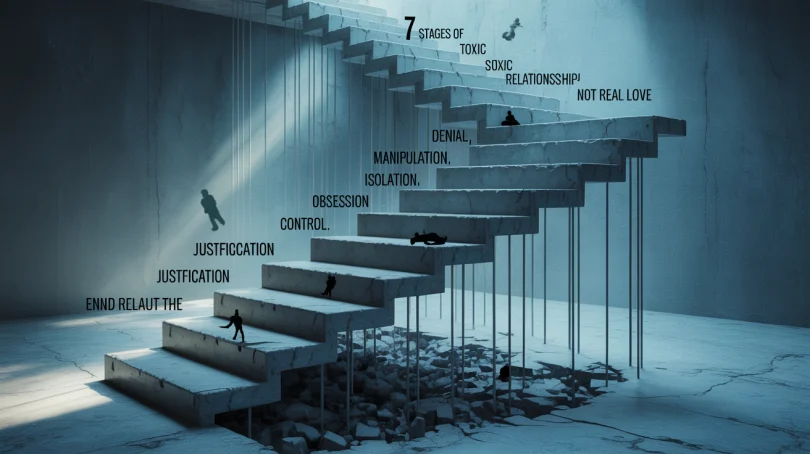Understanding Toxic Relationships Ever felt like you’re stuck in a relationship with someone who hurts you but keeps pulling you back in? Toxic relationships are characterized by patterns of harmful behaviors, emotional manipulation, or verbal and psychological abuse. They can be romantic, familial, or platonic in nature and can create a confusing and damaging loop that’s really hard to get out of. Worst of all, toxic relationships can feel good at times, making them all the more confusing and harder to leave. However, recognizing these stages can help you understand what’s happening and figure out what to do next.
Stage One: Idealization
Toxic relationships often start off seeming perfect. Your crush showers you with compliments, affection, gifts, and over-the-top gestures, saying the most romantic things like, “I’ve never felt this way before” or “You’re my soulmate.” But is this too good to be true? Are they moving too fast? This intense idealization, characterized by love bombing, is designed to make you dependent on their validation. They might also ask about your fears or secrets not to build intimacy, but to use them against you later.
Stage Two: Devaluation
Once a toxic manipulator knows they have you, things quickly take a turn for the worse. Manipulators often engage in devaluation as a means to assert control and power over you. They’ll suddenly become harsh and critical, pointing out your flaws and making hurtful comments. The personal information you shared is now used against you, with them throwing your biggest insecurities back in your face. Worst of all, you might feel confused and blame yourself for their behavior. You try to meet their demands, but their expectations are unrealistic and never-ending, so you just end up feeling worse about yourself. When your self-esteem is low, it’s easier for them to control you and stop you from standing up to them. You might even start to believe you’re not good enough and don’t deserve better, which is exactly what they want.
Stage Three: Manipulation
Do you often feel confused or unsure of what’s true? Do they make you feel guilty for their mistakes? In a toxic relationship, manipulation can be subtle. Your partner might twist situations to make you feel guilty or to get their way. They might play mind games, lie, or withhold information. Phrases like, “If you really loved me, you would…” or “You’re imagining things,” are often used to control you and make you question your reality. They might say things like, “You’re making me act this way” or “I only do this because I care,” to justify their behavior.
Stage Four: Isolation
At this stage, the other person may start to isolate you from your friends and family. They might say things like, “They don’t really care about you” or “I’m the only one who truly understands you.” By doing this, they gain more control over you and limit your support system. Ask yourself: Have I distanced myself from loved ones because of this relationship? Do I feel alone? You might notice you’re spending less time with loved ones and more time with the toxic person. Remember, a healthy relationship should expand your world, not shrink it.
Stage Five: Reverse Discard
When they’re done with you, feel bored, or you start seeing through their lies, they may use the reverse discard tactic. Instead of ending things abruptly, they manipulate you into breaking up with them. They might frustrate or upset you with neglect, constant criticism, or withholding affection. For example, they might nitpick your appearance or actions, making you feel unappreciated, or become emotionally distant, making you feel ignored and unloved. The goal is to push you to the point where you decide to end the relationship. Why would they do this? Wouldn’t it be easier to break up directly and move on? It’s all about power, reputation, and control. By making you initiate the breakup, they avoid responsibility and get to play the victim, claiming they were abandoned. This makes you look like the bad person and manipulates you into believing it. It also leaves the door open for them to come back later when they feel like it a tactic known as hoovering.
Stage Six: Direct Discard
If the reverse discard tactic doesn’t work and you still stay despite their abuse, they may eventually discard you directly as a final resort. In this stage, they reject you, making you chase after them. As harsh as it sounds, some manipulators do this to keep you as their backup while they seek out a new potential partner and use the same manipulative tricks to control the new person as their new “supply.” Our brains are wired to want things that seem out of reach, so when they act distant, they appear more valuable and desirable, making it hard for you to leave them. Once they find someone new to manipulate, they might suddenly cut you off. This can be shocking and hurtful, leaving you feeling blindsided. They may even publicly humiliate you, making a big scene of dumping you or blaming you for everything. This tactic makes them feel powerful while making you feel worthless. It’s all part of their manipulative plan to keep you hooked until they find a new supply, so they don’t have to be alone.
Stage Seven: Healing
Being discarded can leave you feeling devastated and confused. Even if you’re the one who cut ties and walked away, you can still feel hurt and confused, bombarded with “what ifs” and “should have, could have been” thoughts. You might question your self-worth and wonder what you did wrong. It’s common to feel a mix of relief and pain as the toxic cycle is finally broken, but the emotional wounds remain. Understanding and learning from this experience is essential. By acknowledging the toxicity and its impact on your well-being, you can begin the journey toward healing. This stage is marked by seeking support, reframing your perspective, and recognizing that you are not defined by that toxic relationship. It’s also about embracing your worth, practicing self-care, setting better boundaries, and coming out on the other side happier, more empowered, and with healthier relationships.







Leave a Comment